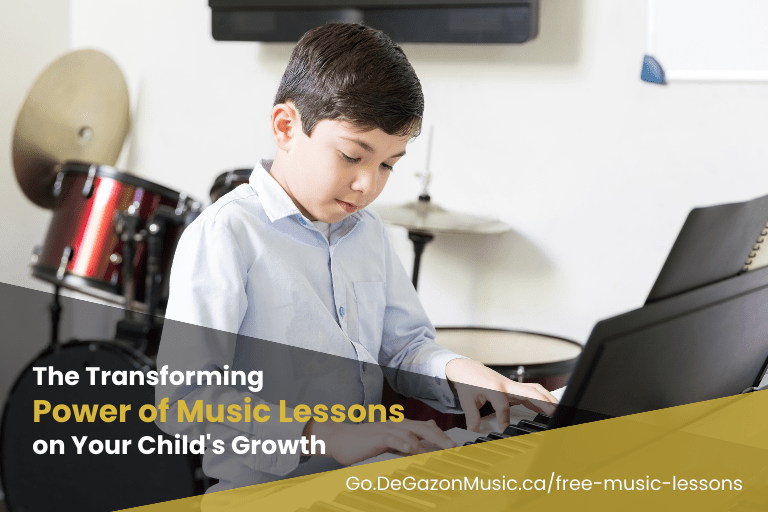The Transformative Power of Music Lessons on Child Development

Music, an art form that resonates with the soul, has the remarkable ability to shape and enhance a child’s development in ways that go far beyond the melodies themselves. Research consistently highlights the numerous benefits of introducing children to music lessons at an early age.
From cognitive growth to emotional well-being, the advantages are truly remarkable. In this article, we will delve into the transformative power of music lessons on a child’s development.
Is it Beneficial for Kids to Learn an Instrument?
Without a doubt, learning an instrument produces many benefits. Music education isn’t solely about creating the next prodigy; it’s about nurturing creativity, discipline, and cognitive skills.
Learning to play an instrument or sing cultivates patience, focus, and perseverance. Moreover, it introduces children to the joy of self-expression and the satisfaction of mastering a complex skill.
What is the Optimal Age to Begin Music Lessons for Kids?
The question of when to start music lessons is common among parents. The consensus among experts suggests that exposing children to music early in life, even during infancy, can be highly beneficial.
Babies have an innate sensitivity to sound and rhythm, which can contribute to the development of their auditory processing skills.
As they grow, around the age of 3 or 4, they will benefit from a music, movement and rhythm program.
At ages 4 or 5 they are becoming more ready to learn an instrument with private music lessons. Starting early allows them to develop a strong foundation and a lifelong appreciation for music.
Should I Force My Child to Take Music Lessons?
This isn’t really about “forcing”; it’s sort of like brushing your teeth or the “classic” eating your vegetables. We as parents have a broader view of the world and what’s important, and what needs to be accomplished or learned, and how best to do that.
But, in the case of music lessons, a healthier way to look at it as parents is just that we are “deciding” for them (instead of “forcing”). And remember, this doesn’t then mean that it’s not going to be fun, or learn what they need to learn and enjoy it.
The goal is to instill a genuine love for music while receiving all the benefits.
Does Learning Music Have Positive Effects on Kids’ Brains?
Absolutely. Scientific research has shown the positive impact of music on a child’s brain development.
Learning to play an instrument engages various parts of the brain, enhancing memory, spatial reasoning, and problem-solving skills.
Music also stimulates neural connections that contribute to language development, leading to improved reading and verbal skills.
The rhythmic patterns in music can even assist in mathematical understanding.
The Benefits of Music in a Child’s Development
The advantages of incorporating music into a child’s development are truly remarkable and wide-ranging:
- Cognitive Development: Music stimulates various cognitive functions, enhancing memory, attention, and multitasking abilities. It’s no wonder that many successful individuals attribute their accomplishments to early music education.
- Confidence Boost: Mastering a piece or performing in front of an audience boosts a child’s self-esteem and confidence. These positive experiences contribute to a healthy self-image and develop a sense of accomplishment.
- Growth Mindset: Learning an instrument helps children learn to persevere through challenges and setbacks. A child with a developing growth mindset will be more likely to see a difficult task or obstacle as an opportunity to learn and grow, rather than a roadblock to success.
- Cultural Appreciation: Music exposes children to various cultures and traditions, fostering an open-minded and culturally sensitive outlook.
- Self-Regulation: The ability to focus on a task, understand your behaviour, and manage your reactions to feelings and things happening around you.
- Discipline and Patience: Learning to play an instrument requires consistent practice and discipline. Children develop patience and a strong work ethic as they strive to master their chosen instrument.
- Emotional Well-Being: Music is a powerful emotional outlet. Children learn to express their feelings through music, which can be particularly beneficial for those who might struggle with verbal communication.
- Social Skills: Group music lessons or ensemble playing provide opportunities for collaboration and cooperation. Children learn to listen to others, follow cues, and work together towards a common goal.
Introducing music into a child’s life is a gift that keeps on giving. It’s an investment in their overall development that pays off throughout their lives.
As you think about the incredible benefits of music education for your child, we invite you to claim a Free Music Lesson Voucher here.
Unlock the potential of your child’s mind and soul through the magic of music education.
In conclusion, music lessons offer a profound opportunity to shape a child’s cognitive, emotional, and social development.
By introducing them to the world of melodies and harmonies, you provide them with tools that will serve them well in various aspects of life.
Whether they become professional musicians or simply carry their love for music into their daily lives, the impact of music education is great.
